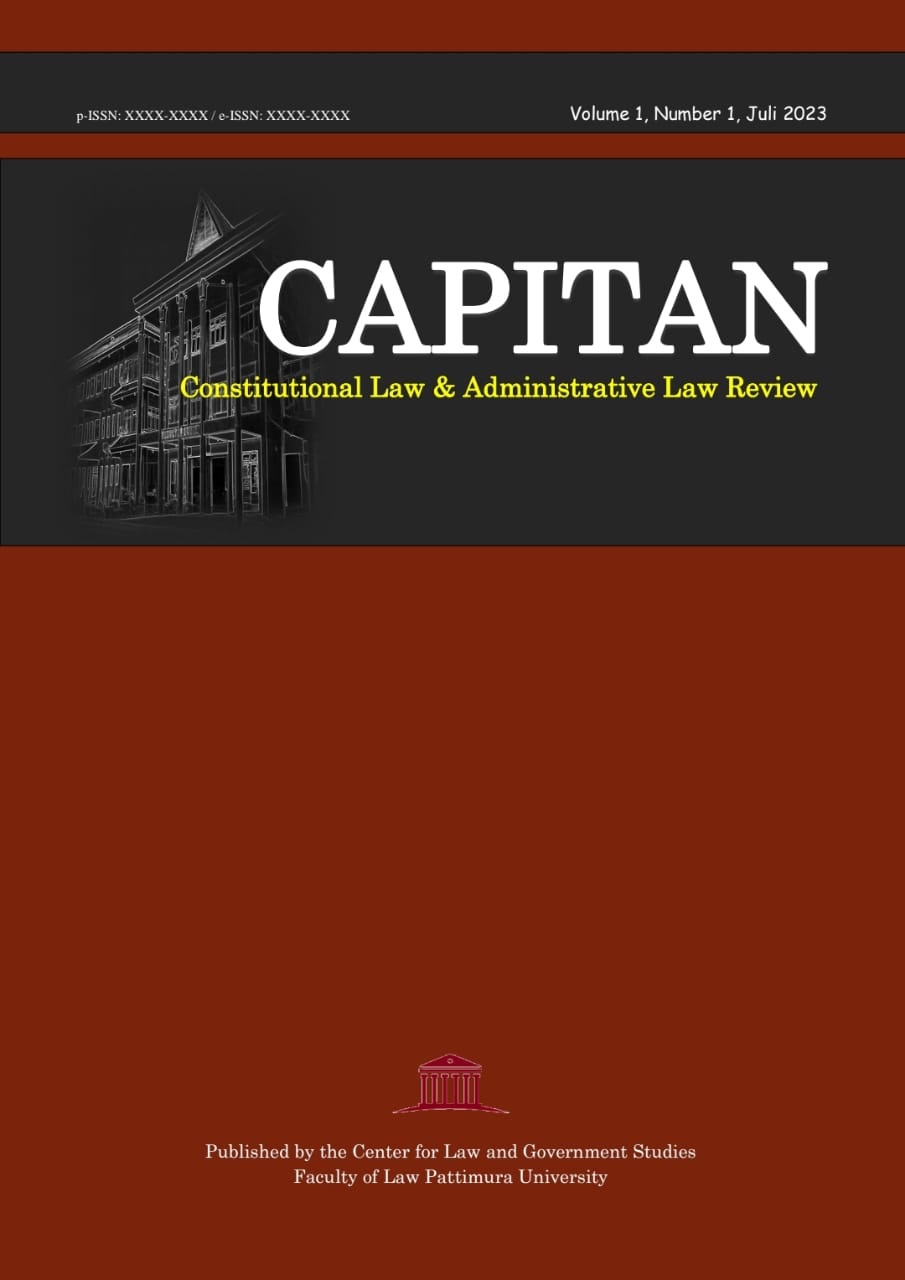Tanggung Jawab Polisi Sebagai Penagih Hutang
Abstract
This research discusses the responsibilities of the police as debt collectors, where legally, in carrying out their duties, the police must comply with the disciplinary rules for police officers, one of which is that they are prohibited from being debt collectors or protecting people who have debts, as stated in Article 5 letter (h) of the Regulations. Government Number 2 of 2003 concerning Disciplinary Regulations for Members of the National Police of the Republic of Indonesia states that police are prohibited from being debt collectors or protecting people who have debts. However, in one example of the case in South Buru, namely the cooperative case, Lisa Fano, in her interview, once used police services as a source of threats. in collecting debts and one of the Palamaria families also often uses the services of the police as collectors and protectors. In this case the borrower does not use the services of a collector but uses the services of the police so that they feel that with the police, it will be easy to carry out the collection. The problem taken in this research is whether the police are responsible as debt collectors and what are the legal consequences if the police become debt collectors. The research method used in researching and discussing this problem is normative juridical. The legal materials used are primary, secondary and tertiary legal materials. Research results Based on the duties of the police as contained in Law number 2 of 2002, the police are not authorized to collect debts then the legal consequences for police who become debt collectors based on police regulation number 2 of 2003 can be subject to sanctions in the form of dishonorable dismissal, through The procedure is based on Regulation Number 2 of 2003, the legal consequences for the police are that they can be given heavy sanctions, namely dishonorable dismissal.
Downloads
References
Hotma P. Sibuea, Asas Negara Hukum, Peraturan Kebijakan, & Asas-Asas Umum Pemerintahan yang Baik, Jakarta: Erlangga, 2010.
Fakhrisya Zalili Sailan, Hubungan Hukum, Negara, dan Kekuasaan, di akses di http://zalilifakhrisya.blogspot.co.id/2013/11/hubungan-hukum-kekuasaan-dan-negara.html.
Peter Mahmud Marzuki, Penelitian Hukum, Jakarta: Kencana, 2007.
https://id.scribd.com/document/623022783/Bolehkah-Polisi-Menjadi-Penagih-Utang.
Marwan Mas, Pengantar Ilmu Hukum, Bogor: Ghalia Indonesia, 2003.
Jazim Hamidi, Revolusi Hukum Indonesia: Makna, Kedudukan, Dan Implikasihukum Naskah Proklamasi 17 Agustus 1945 Dalam Sistem Ketatanegaraan RI, Yogyakarta: Konstitusi Press & Citra Media, 2006.
Soedjono Dirdjosisworo, Pengantar Ilmu Hukum, Jakarta: Raja Grafindo Tinggi, 2010.
Satjipto Rahardjo, Ilmu Hukum, Bandung: Citra Aditya Bakti, 2006.
Jum Anggriani, Hukum Administrasi Negara, Yogyakarta: Graha Ilmu, 2012.
Copyright (c) 2024 Febriens Melfrens Alfons, Julista Mustamu, Vica Jillyan Edsti Saija (Author)

This work is licensed under a Creative Commons Attribution-NonCommercial 4.0 International License.
Authors who publish their manuscripts in this Journal agree to the following conditions:
- The copyright in each article belongs to the author, as well as the right to patent.
- Authors are able to enter into separate, additional contractual arrangements for the non-exclusive distribution of the journal's published version of the work (e.g., post it to an institutional repository or publish it in a book), with an acknowledgment of its initial publication in this journal.
- Authors are permitted and encouraged to post their work online (e.g., in institutional repositories or on their website) prior to and during the submission process, as it can lead to productive exchanges, as well as earlier and greater citation of published work.
- Authors have the right to self-archiving of the article (Author Self-Archiving Policy)













